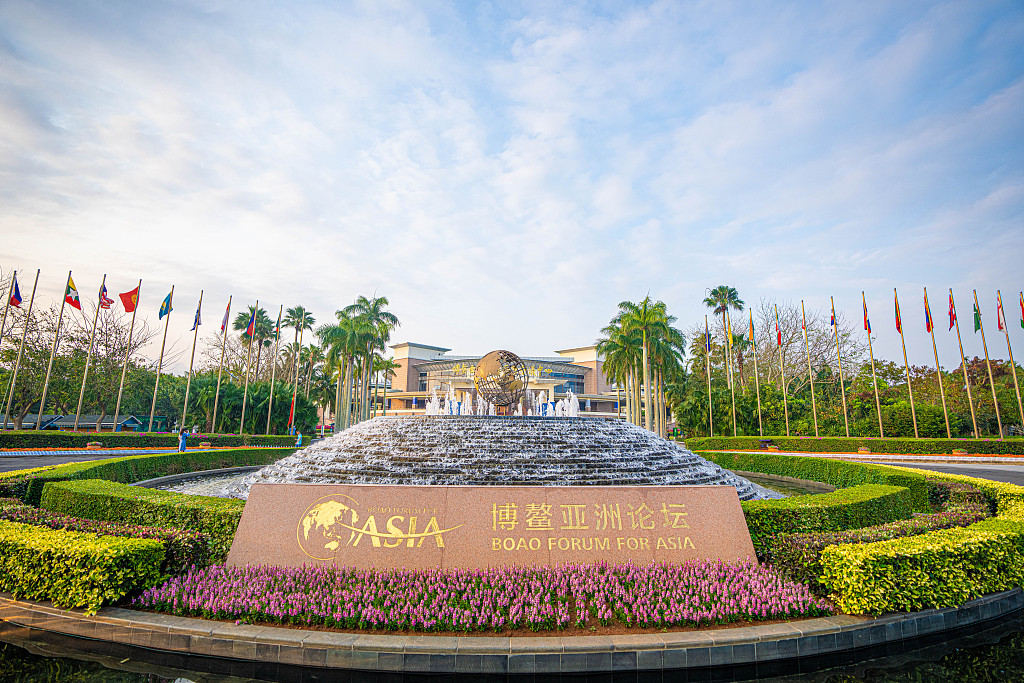2023 Boao Forum signals hope for global economy amid tensions
- By Hamzah Rifaat Hussain
 0 Comment(s)
0 Comment(s) Print
Print E-mail China.org.cn, April 3, 2023
E-mail China.org.cn, April 3, 2023

The Boao Forum for Asia (BFA) International Conference Center in Boao, south China's Hainan province, March 26, 2023. [Photo/CFP]
The 2023 Boao Forum for Asia, often dubbed the "Asian Davos," exuded optimism about the global economy's future. Chinese Premier Li Qiang, joined by politicians, ex-officials, and business leaders such as IMF Chief Kristalina Georgieva, centered discussions around building a more resilient future without succumbing to great power competition. Li emphasized China as the second largest economy in the world, stating its commitment to "injecting new impetus and vitality into global economic development." The message came with caution over how potential chaos and conflict in the Asian region, especially the Asia Pacific, must be avoided at all costs. By positioning China as an "anchor for world peace," the forum presented a roadmap for collective economic prosperity.
The reasons for this optimism are clear. The forum hosted dozens of business leaders, including Apple CEO Tim Cook, Blackstone founder Stephen Schwarzman, and HSBC CEO Noel Quinn. Participating political leaders included Spanish Prime Minister Pedro Sanchez and Malaysian Prime Minister Anwar Ibrahim. The distinguished attendees were briefed on the Chinese economy's trajectory toward recovery following the optimization of COVID-19 measures. The recovery presents opportunities for foreign direct investment to resist the global economic downturn.
Premier Li's emphasis on China's openness to the world is a crucial takeaway. As the global community grapples with the ongoing Ukraine crisis, harmful economic decoupling from the United States targeting China's tech sector and supply chain issues, countries worldwide stand to benefit from the continued opening up of the world's second-largest economy and investor-friendly policies. Trends in 2022 indeed point in the right direction. FDI inflows to Beijing reached $189.1 billion, an increase of 12% in 2022 compared to 2021. The IMF also projects China to contribute one-third of global economic growth this year. Foreign corporations will benefit considerably from further access to the Chinese market.
Positive trends aside, promoting regional connectivity without camp politics, bloc confrontation and militarization was also high on the agenda at the forum. Premier Li called for extensive cooperation with the 10-member ASEAN bloc to build on the existing partnership, where trade grew by 15% in 2022 alone.
Similarly, on the concept of democratic accountability, which stands in stark contrast to the American concept of leveraging democracy to demonize systems in other countries, there was agreement among all stakeholders at the forum that values and ethics while dealing with partners, both bilaterally and multilaterally, must remain paramount. For example, Malaysian Prime Minister Anwar Ibrahim stated that democratic accountability urges leaders to provide improved living standards and practice good and effective governance.
Another key aspect of an ideal world order discussed at the forum was advocating for big powers to act responsibly to ensure that non-political economic cooperation remains unfettered, untainted and unaffected. Singaporean Prime Minister Lee Hsien Loong stated that Asia's promise relies on powers such as China and the U.S. managing their differences and pursuing cooperation instead of confrontation.
For this to happen, however, negative portrayals of China in American discourse must stop. Baseless propaganda demonizing Beijing and undercutting its economic significance for countries in the region cannot detract from realities such as the near-universal participation of member states in the Belt and Road Initiative and how the Regional Comprehensive Economic Partnership (RCEP) has played a positive impact in boosting world trade. The RCEP pact, which entered into force at the start of 2022, includes China, ASEAN, New Zealand, Australia and South Korea, accounting for $1.87 trillion in trade in the same year. It is slated to expand to align with other comparable trade and investment pacts, such as the Comprehensive and Progressive Agreement for Trans-Pacific Partnership (CPTPP).
The understandings reached, the goodwill expressed and the commitment to pursuing a world order devoid of great power politics, polarization and Cold War were the hallmarks of the 2023 Boao Forum for Asia. Global economic development and collective prosperity are certainly possible if the spirit of the forum is carried forward.
Hamzah Rifaat Hussain is an assistant research associate at the Islamabad Policy Research Institute.
Opinion articles reflect the views of their authors, not necessarily those of China.org.cn.
If you would like to contribute, please contact us at opinion@china.org.cn.






Go to Forum >>0 Comment(s)